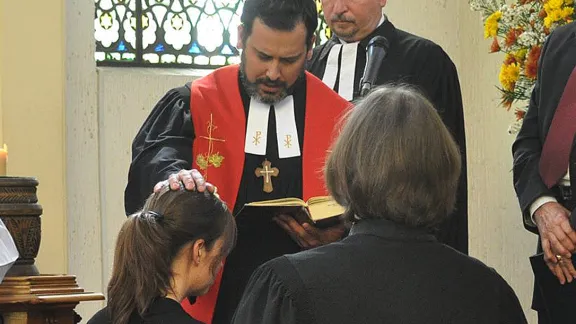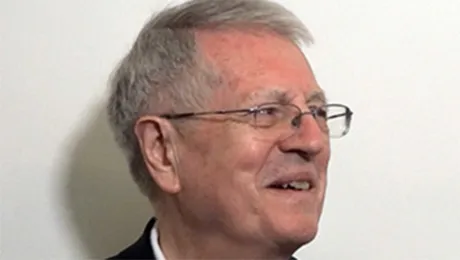
Ordination ceremony of Hanna Schramm in April 2014. Photo: LWF/Leonardo Pérez
Interview with Rev Hanna Schramm, the first woman minister of the Lutheran Church in Chile (Iglesia Luterana en Chile, ILCH)
(LWI) - Hanna Schramm is breaking new ground in two senses: previously the ministers of the Lutheran Church in Chile (Iglesias Lutheran en Chile, ILCH) were trained and ordained in Germany. After her studies in Leipzig, Hanna Schramm completed her ministerial training with a placement in a congregation in Chile – and was then ordained as the first woman in the ILCH. In an interview with Lutheran World Information (LWI) she speaks of treasures and challenges, of the importance of religious education in Chile and how the congregations react to a woman in a cassock.
Where do you find the richness of the church in Chile?
The greatest treasure possessed by the two Lutheran churches in the Chilean religious landscape is Lutheran theology, which emphasizes freedom of conscience and independent debate about the biblical testimony to the faith. If the churches make this theology their focal point, then they offer a genuine alternative to people who have already distanced themselves from the churches. The Lutheran Churches are a place where ethically difficult issues can be discussed, where information from other areas of scientific knowledge can be brought into the conversation in order to develop one’s own opinions, where different attitudes are tolerated and where people can even express their doubts about faith.
In conversations with members I have been struck by the fact that quite a few of them have found their way to the Lutheran churches because they have experienced them to be very inclusive in respect of moral issues. In my view, the Lutheran Churches should build on their strengths in encouraging dialogue, plurality and the formation of critical opinions, but at the same time not to be forgetful of the spiritual framework and our hope in God’s rule.
A further source of richness is the variety of backgrounds and characteristics of the individual ministers. In this way the members of the local congregations can experience different forms of piety and interpretations of the Bible.
Working for integration in the congregation
Where do you see particular challenges in working in a local church?
It is getting harder for the ILCH to find people who will get involved and take an active role. Contact to the church often remains very loose and is predominantly only for special liturgical occasions or through religious education in the German school. Earlier on the sense of belonging was much more intensive, since belonging to the Lutheran Church was a way of strengthening one’s German identity.
But in the meantime, a German or Lutheran identity has come to play a much smaller role. More and more Christians are coming into the congregations of the ILCH who are not of German origin. It is therefore important to develop congregational life in the ILCH in such a way that Christians from different generations and backgrounds feel is relevant to them. Congregations must work towards integration between the various interest groups.
I also see an exciting challenge in engaging in discussion about our Lutheran identity, for Lutheran theology offers ways of thinking, concepts and styles of piety which offer an alternative to people who are conscious of a religious need, but who for all kinds of reasons have distanced themselves from the church. Above all, the Lutheran Churches could become a spiritual home, particularly for people who would like to engage on an intellectual level with religious questions and issues affecting their lives.
You are the first woman to be ordained in the ILCH. What does that mean for you?
As a woman, exercising a vocation that in Chile is still strongly associated with men causes astonishment and joy, but sometimes people are also irritated, skeptical or hostile. I have learnt to be relaxed about being in receipt of this skepticism. I believe that my very presence is already making a big difference. People can see that it is possible and indeed normal for a woman to take on the duties of a minister, and will thereby become accustomed to it.
Empowering women
What is the particular challenge in this situation?
For me this has first of all meant needing to understand that for many people a woman minister is not a normal thing. I had to learn not to shut myself off, or to become demotivated if people treated me with skepticism or rejection. I have even managed to develop an understanding of this. However, I have always kept in mind that the ordination of women is normal in other countries and that I also have women colleagues in the Evangelical Lutheran Church in Chile (IELCH), as well as in some other Protestant Churches in Chile.
For me it is very important that I make a particular effort with those people with whom I am working, and that I carry out all my tasks with commitment and joy. Through my work, and the experiences that people have of me, I can help towards the acceptance of women ministers as spiritual directors and theologians.
Will there soon be more ordained women in your church?
I don’t know of any woman who is studying theology just now and who will come into the ILCH. But I do know young women who are very interested in theology and are actively involved in the local churches. They would love to study theology in the future. I think that a great deal of encouragement will need to be offered here. The fact that a woman has come along and has been ordained and accepted as a minister is certainly a great contribution towards encouraging more young women to be interested in this calling. They can see that this possibility is now open to them as well.
In which local congregation will you now be working?
I will continue to work in Santiago, where I have also completed my probationary placement. I will have a half-time post there, as I am undertaking studies in education at the same time. My main focus will be working wtih young people and young adults in the congregation. In addition I will also be visiting homes for old people. I will also be supervising German volunteers involved in various projects of the Lutheran churches.
Accompanying people on the journey of faith
Why is it important to you to be able also to engage in religious education in Chile?
It is through religious education that children and young people can be motivated to join in confirmation classes and to develop a sense of belonging to the Lutheran congregation. The other side of the coin is that, as a teacher of religion, ministers remain in contact with the children and young people and are able to have a stronger relationship with them in the general pastoral work. In addition, the Lutheran local churches in Chile are really small, and so the ministers can help their congregations financially by taking on this ancillary work. And last but not least I will learn a great deal through my educational training that will help with my work in the congregation.
What are you looking forward to most?
There are lots of things: studying the Bible together with young people and young adults, or the privilege of having an insight into the way of life of other people. I am looking forward to seeing how people commit themselves to getting involved in a project and how they get to grips with initiatives in the local church and community and I look forward to being able to support that. I am looking forward to establishing new contacts. I am particularly looking forward to collaborating on the next Youth Retreat and seeing it through, because I will learn so much about human nature, creativity and spontaneity. I look forward to being able to accompany people on their journey of faith.
Translation from the German


